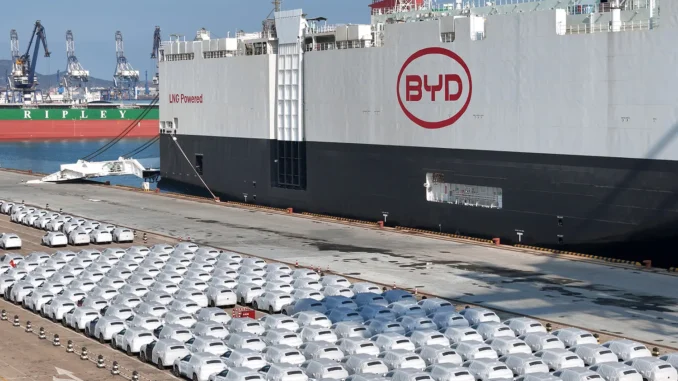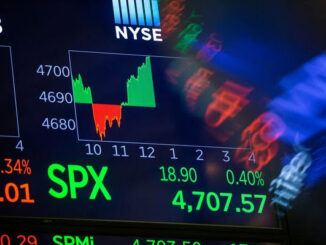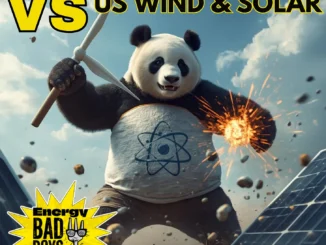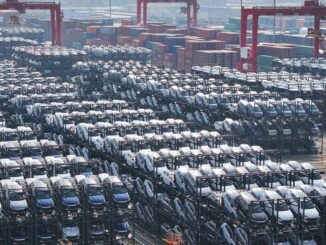
China wants to contain growing trade threats without further alienating Europe.
The European Union is expected to launch its latest salvo in a brewing trade battle with China on July 4 when it raises tariffs on made-in-China electric vehicles. China, for its part, appears to be preparing for a food fight.
Over the last six months, China has launched anti-dumping investigations into European pork and brandy, while Chinese state media reports have hinted that dairy products and other items might also be on the table. The Chinese Ministry of Commerce has made no explicit connection between the investigations and Europe’s EV restrictions, but trade experts say these are among the products China might target if it chooses to retaliate with its own tariffs in the coming months.
The impending showdown is the latest front in a growing worldwide confrontation with China over its export of cheap clean energy products. The tide of exports, from solar panels to electric vehicles, has allowed countries to lower emissions at a discount, but at the same time, it has threatened domestic manufacturing from the United States to Germany and beyond.
How China responds to the EU’s tariffs in the coming months will be an important indicator in its efforts to head off this wider barrage of trade challenges. China is trying to keep the EU, its second-largest trading partner, and other countries from following the protectionist path paved by the United States.
China likely saw the United States as a “lost cause” when it came to responding to EV tariffs imposed by the Biden administration in May, said Gregor Sebastian, a senior analyst at Rhodium Group based in Berlin. But the EU has taken a more moderate approach, with the preliminary tariffs capped at 48 percent rather than the 100 percent set by the United States. China is still hopeful that it can maintain some market access in the EU, and it now has until November, when the tariffs are set to be finalized, to negotiate.
“It’s not just about the EU itself; China wants to use this as a model, to show how these issues can be resolved through negotiation,” said Zhao Yongsheng, a professor at the University of International Business and Economics in Beijing.
China and the EU are now entering the first phase of that negotiation process. The two sides agreed to begin talks on June 22, with China hoping to broker a last-minute deal to head off the preliminary tariffs. With a deal unlikely to come through, the tariffs will go into effect as scheduled on July 4, and China most certainly will take retaliatory action. “China urges the EU to immediately correct its wrong practices,” said a Ministry of Commerce spokesperson in a press statement on June 12, adding that it “will resolutely take all necessary measures to firmly defend the legitimate rights and interests of Chinese companies.”
China’s basket of potential retaliatory measures reflects its balancing act—at once trying to demonstrate its leverage without further alienating the EU. European and Chinese trade experts told Foreign Policy that China will likely target products that meet several conditions: The product should be valuable to the EU as an export but not so critical as to be overly escalatory; it shouldn’t fall within China’s core interests; it should come from a country with significant leverage in the EU; and it should activate a core political group in that country to lobby against the tariffs.
“The idea is to sow discord among EU member states and dilute a collective response,” said Janka Oertel, director of the Asia program at the European Council on Foreign Relations. “The strategy has worked in the past.”
Brandy may seem like a niche product to target, but it meets Beijing’s criteria. Perhaps most critically, 99 percent of China’s brandy comes from France, which supported the charge to protect the EU EV industry. China imported $1.73 billion in brandy from France last year, according to Chinese customs data—about a tenth of the value of its EV exports to the EU but not insignificant.
China put the industry on alert back in January when its Ministry of Commerce launched an investigation into the European industry’s dumping practices. When Chinese President Xi Jinping visited France in May, the brandy industry lobbied hard to drop the investigation, saying tariffs would be “extremely damaging,” and French President Emmanuel Macron claimed that Xi committed to avoid implementing tariffs on the industry. However, China’s final decision is expected to be released by August, when state media has reported that China will conclude its investigation.
Beyond brandy, China is also eyeing other agricultural targets that could trigger a political response from farmers and industry associations. After the EU announced its decision in early June to impose the preliminary EV tariffs, the Ministry of Commerce initiated a similar probe into EU pork imports, which mainly come from Spain, the Netherlands, Denmark, and France. Spain alone exported $865 million of pork to China in 2023, and European nations have been increasingly looking to China as a destination for their pork products.
Chinese state media accounts have also referenced a mélange of other possible items that could be on the chopping block, including dairy products, aerospace products, and large-engine vehicles.
If no agreement is reached in the near term, China may escalate beyond agricultural products by limiting its orders from European aviation giant Airbus, Zhao said. However, that comes with risks. “I don’t think the aerospace threats are really believable, because I don’t really think China wants to target products where they’re so dependent,” Sebastian said.
As for large-engine vehicles—those used in large sedans and SUVs—in an interview with the Global Times in May, a leading Chinese auto industry expert called for tariffs to be raised as high as 25 percent. Those tariffs would hit Germany the hardest—it accounts for 36 percent of China’s imports of large gas-engine cars, according to the Rhodium Group. German automakers Porsche and BMW would be among the most affected. However, China is unlikely to play this card, at least in the near term, Zhao said. The German government has already been lobbying against the EU tariffs due to its automakers’ large manufacturing presence in China, so it may not need a further push.
Which items China chooses off its retaliatory menu will be revealed in the coming weeks and months; however, its threats alone appear to have had an effect by bringing the EU to the negotiating table. Yet experts say it is unlikely that China can use economic coercion to get enough EU nations together to oppose the European Commission’s decision, as a majority of EU nations did 10 years ago when the EU tried to implement tariffs on Chinese solar panels.
Short of that, experts see a wide range of possible scenarios. “The likely outcome is that the countervailing duties will come into effect in a form similar to the one we have seen initially announced,” Oertel said. Other experts said a deal might be possible involving some combination of the EU lowering the tariffs, China imposing a quota on its own exports, and China increasing investment in European factories.
China’s carrots may end up being more pivotal in forging a deal than its sticks, argued Ilaria Mazzocco, a senior fellow at the Center for Strategic and International Studies. “I do think what’s actually, probably more effective is this argument they’re making that [the tariffs] are bad for climate and that, look, Chinese companies are so willing to invest domestically in the European Union.”
With the United States closed off to Chinese EVs and countries from Brazil to Turkey imposing similar restrictions, China is treading carefully, fearing more crackdowns on its clean-tech exports to come. “There’s a wider worry that China won’t be able to leverage its strength in these technologies in the European market,” where decarbonization is high on the agenda, Sebastian said. “If you take Europe away, what are you left with?”
Take the Survey at https://survey.energynewsbeat.com/






